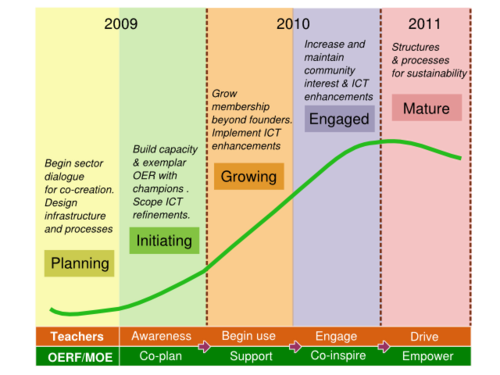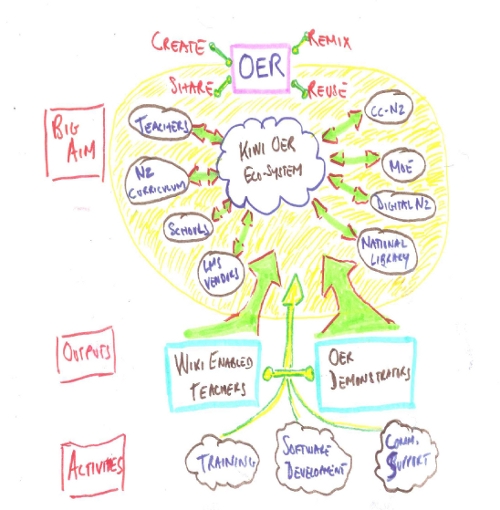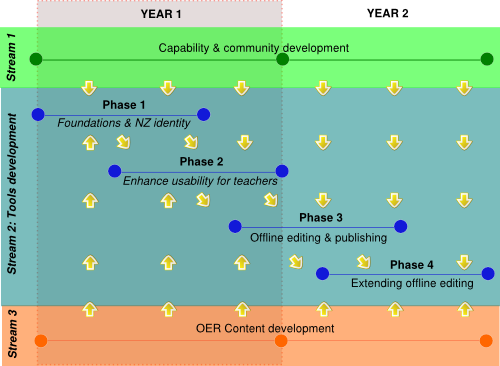Reusable and portable content for New Zealand schools
| Work in progress, expect frequent changes. Help and feedback is welcome. See discussion page. |
Contents
- 1 Executive summary
- 2 Project plan
- 3 Project outcomes and outputs
- 4 Outcomes
Executive summary
(![]() : Will be completed after consultation and discussion of the draft with the MLE community)
: Will be completed after consultation and discussion of the draft with the MLE community)
Project plan
Context
- MLE strategy vision and Reusable & portable content as priority area
- How does this proposal link with the digital strategy?
- Scoping paper: Using Wikis for Developing, Sharing and Reusing Educational Content
Strategy
The Ministry of Education and the Open Education Resource Foundation (OERF) propose to implement a maturity model approach to support the development of a sustainable and scalable OER collaboration for reusable and portable digital content in New Zealand schools.
The strategy aims to start planning the co-design of a national OER initiative in collaboration with the sector, ultimately shifting to a project owned and driven by New Zealands' teachers. During the initial phases the Ministry of Education and OER Foundation will support the sector in building capacity and an inventory of OER examples as the foundations for achieving an engaged national community of teachers. Ultimately, we plan to build a sustainable and active community of teachers empowered to transform learning in the classroom using digital OERs and shared experiences. Components of our theory of action are summarised below, and should be read in conjunction with the conceptual map illustrated in Figure 2.
- Our big aim is to foster the development of a sustainable OER ecosystem for New Zealand teachers to create, share, repurpose and reuse digital content in collaboration with key agencies, institutions and technologies building on the international experiences of mass-collaboration exemplified by the wiki model. A key requirement is that the reusable and portable content solution must operate within the context of the MLE inititative and inter-operate well with other technical solutions that form part of that initiative.
- Outputs: We believe that modelling best practice by adopting a learn-by-doing approach through cycles of continuous improvement is the best way to catalyse a successful national collaboration. Therefore we will focus on enabling educators to use wiki technology and encourage New Zealand's best teachers to develop OER examples to inspire and encourage nation-wide participation. In parallel, we also need to refine the technologies and tools making them easier to use, while finding creative ways to map our OERs with the New Zealand curriculum. Specifically the following outputs are specified for year 1 of this project:
- Wiki enabled teachers: Train 145 teachers in basic wiki authoring
- OER demonstrators: Develop 245 OER examples in WikiEducator based on the New Zealand curriculum.
- Key activities Three major activities are planned to contribute to the attainment of the stated outputs.
- Training activities to build capacity and extend OER content examples: Using the Learning4Content model we will provide basic wiki training and award contestable honoraria for developing high quality OER examples.
- Software and tools development will improve usability of the technology for newcomers to collaborative online authoring. We will publish open APIs to facilitate ease of OER content integration with the technology platforms of the MOE approved LMS vendors.
- Community development and support: Establishing a thriving OER community beyond the founders and early adopters requires appropriate mechanisms to support community development. We plan to establish an OER Ambassadors initiative so that teachers will have a local point of contact and easy access to relevant and up-to-date information on the progress of our national collaboration as well as a direct feedback loop to encourage continuous improvement for the duration of the project.
Project outcomes and outputs
Project aims
The medium term outcomes for this project are to:
|
Overview
- Stream 1: Capability and community development
- Stream 2: Tools development
- Stream 3: OER content development
The outputs for each phase of the project should be read in conjunction with the scoping paper commissioned by the Ministry of Education: Using wikis for developing, sharing and reusing educational content.
Figure 3 depicts a 2-year roadmap, illustrating the relationships among the three streams of the project. Note that this funding proposal is restricted to activities for Year 1 in establishing the foundations necessary for a national OER collaboration in the New Zealand school sector, as depicted by the highlighted area for Year 1 in Figure 3. The capability and community development (Stream 1), and OER content development (Stream 3) continue for the duration of the project and lessons learned will inform the tools development stream. The sub-phases of tools development stream are incremental, and each phase is informed by the outputs of the preceding phase. In this way, the project utilises the benefits of agile software development based on iterative development where requirements and solutions evolve from interactions with the system and its users. The tools development stream is subdivided into four phases:
- Phase 1: Establishing foundations and creating a unique New Zealand identity for the initiative (Year 1)
- Phase 2: Rich text editing and meta data solutions for online content (Year 1)
- Phase 3: Offline editing and repository solutions (Year 2)
- Phase 4: Extending offline editing and content packaging capabilities (Year 2).
We envisage a 5th phase focusing on synchronising and federating a collection of wiki instances. However, this is dependent on international collaboration and additional offshore funding support. Synchronizing and federating a collection of wiki instances is a major technical task, and should be expected to require significant development resources to produce a robust and reliable solution, and is therefore not included in the roadmap illustrated in Figure 3. However, this would represent a major step forward in reducing local bandwidth costs while drawing on the benefits of a global content collaboration.
Guiding principles
The overall aim of this initiative is to establish a self-sustaining OER ecosystem that empowers New Zealands' teachers to transform teaching practice using digital materials which can be shared, remixed, and reused. In achieving this strategic aim the following principles underpin the design of the initiative:
- The project is restricted to OER interventions. The initiative is not intended to replace or compete with proprietary content solutions used in New Zealand schools but rather to complement and augment the range of reusable and portable content available for use in our classrooms.
- Funding is strategic -- and not intended for ongoing operational support. The funding support is aimed to achieve a critical mass of educators and OER content exemplars required for a sustainable and scalable OER ecosystem.
- The project is designed to support teachers and schools in utilising our collective experience for the benefit of the sector. In this regard, wherever possible, we will use existing resources and skills of practising teachers across New Zealand for planned activities because ultimately the project will be driven by teachers for teachers (See Figure 1 above).
- Pedagogy drives technology refinements. Consequently, tools development will focus on enhancing usability and refining the technology for educational needs of New Zealand teachers within the context of the MLE initiative.
Stream 1: Capability and community development
Year 1
- Anticipated budget: NZ$70,000
- Key outputs
- 20 Trainers trained
- 20 WikiEducator Taster sessions (Face-to-face)
- 5 Online training workshops
- 145 Early adopters trained in collaborative wiki authoring
- NZ teacher community node established and supported
- 150 OER Ambassadors selected and appointed
- Web journalism node established and 4 Newsletters published
Capability development
Aim: To identify and train "early adopters" in collaborative authoring of OER to form the foundation for scaling-up a national OER collaboration for New Zealand schools in year 2.
| Main Activity | Sub activities | Outputs | Target Date |
|---|---|---|---|
| Capability development |
Train-the trainer workshops
Wikieducator taster sessions
Online training workshops
|
|
First 6 months ending 31 Jan 2010
Second 6 months ending 31 Jul 2010
|
Community development
Aim: To establish initiatives and support resources to foster the development of a sustainable and scalable community of New Zealand teachers empowered to transform teaching through OER
| Main Activity | Sub activities | Outputs | Target Date |
|---|---|---|---|
| Community development and support |
Establish NZ OER Ambassadors initiative
Establish a web journalism node
Build a NZ community node on WikiEducator and corresponding support resources
|
|
First 6 months ending 31 Jan 2010
Second 6 months ending 31 Jul 2010
|
Year 2
- Anticipated budget: NZ$62,000
- Key outputs
- 20 WikiEducator Taster sessions (Face-to-face)
- 12 Online training workshops
- 300 Teachers trained in collaborative wiki authoring
- 100 additional OER Ambassadors selected and appointed
- Web journalism node continued and 4 Newsletters published
Capability development
Aim: To build a core cadre of teachers with the capability to participate in collaborative authoring of OER in support of the national curriculum.
| Main Activity | Sub activities | Outputs | Target Date |
|---|---|---|---|
| Capability development |
Reconfigure training materials
Wikieducator taster Sessions
Online training workshops
|
|
First 6 months ending 31 Jan 2011
Second 6 months ending 31 Aug 2011
|
Community development
Aim: To establish initiatives and support resources to foster the development of a sustainable and scalable community of New Zealand teachers empowered to transform teaching through OER
| Main Activity | Sub activities | Outputs | Target Date |
|---|---|---|---|
| Community development and support |
Establish NZ OER Ambassadors initiative
Establish a web journalism node
Build a NZ community node on WikiEducator and corresponding support resources
|
|
First 6 months ending 31 Jan 2011
Second 6 months ending 31 Aug 2011
|
Stream 2: Tools development
Year 1
- Anticipated budget:
- Key outputs:
- Distinctive NZ landing page established
- Research and requirements specification for rich text editing solution
- Explain existing API for LMS vendors
- Implement rich text editing solution incorporating option lists for pedagogical templates
- Implement solution for taging and mapping NZ content to national curriculum.
Phase 1: Technology foundations
Aim: To establish a unique New Zealand identity for the national OER collaboration and to research technical refinements for the next phases of tool development.
| Main Activity | Sub activities | Outputs | Target Date |
|---|---|---|---|
| Technology foundations |
|
|
Target date for this activity: 31 Jan 2010
|
Phase 2: Improve usability through rich text editing and educational specific refinements
Aim: To make the wiki easier to use for all teachers for authoring, searching, and reusing OER content.
The instructional device templates serve two important functions within WikiEducator:
- encourage authors to consider the pedagogical structure of each page of their resource
- provides a small amount of structure within a page which tools can exploit for reusing the content in different ways
With that in mind, it is important that any rich text editor facilitate building this structure into resources and not clutter them with inconsistent presentation-oriented markup.
| Main Activity | Sub activities | Outputs | Target Date |
|---|---|---|---|
| Improve ease of use and reuse |
|
|
|
Year 2
- Anticipated budget:
- Key outputs:
- authors are provided offline editing alternatives using standard office software
- facilitate peer review of contributed resources
Phase 3: Offline editing and peer review
Aims: Attempt to blur the distinction between the repository technology and a desktop application.
OpenOffice provides a comfortable suite of tools for authors that prefer to work offline. Similar to the work done embedding a rich text editor into WikiEducator, care must be taken to provide all of the features authors expect without unduly cluttering the resulting resources making them difficult to reuse. iDevices should be easy to use. Using an existing wiki page as a starting point should be possible. Publishing to the wiki should be straightforward, with clear messages if a conflict takes place because of a simultaneous edit by a collaborator. Embedded images (or other media) should be checked for uniqueness and share existing files where possible.
| Main Activity | Sub activities | Outputs | Target Date |
|---|---|---|---|
| Provide easy-to-use offline authoring alternative |
|
|
|
Phase 4: Tools development - Extending offline editing
Aims: (![]() : Need to refine the aim)
: Need to refine the aim)
Further adapt WikiEducator to teacher authoring habits, adding at least minimal support for offline editing using Microsoft Office tools.
Microsoft Office's proprietary nature makes this difficult to do in a robust, future-proof way. The solution investigated here may range from a droplet that post processes and uploads pages to an add-in that attempts to add a wikitext output filter.
| Main Activity | Sub activities | Outputs | Target Date |
|---|---|---|---|
| Extend offline editing solutions to Microsoft Word. |
|
|
|
Phase 5 - Federated wiki instances
One major piece of work that we envision is the ability to synchronise multiple instances of MediaWiki. For example, this would allow a school or cluster to run their own local instance if they had the need and the IT support to do it. Or it could allow a national instance of WikiEducator separate from the global instance hosted offshore. Achieving this in a robust way will require significant resources outside the scope of this proposal.
| Main Activity | Sub activities | Outputs | Target Date |
|---|---|---|---|
| Allow federating multiple WikiEducator instances. |
|
|
|
Stream 3: OER content development
Aim: Develop a critical mass of OER exemplars to serve as examples for teachers to create, share and reuse digital content.
Year 1
- Anticipated budget: NZ$68,500
- Key outputs
- 145 OER exemplars commissioned
- 100 Existing resources digitised or converted into wiki format.
- Wiki bureau Service:
- Online support services for teachers developing OER
- Limited support for digitising or wikifying existing resources
| Main Activity | Sub activities | Outputs | Target Date |
|---|---|---|---|
| OER Content development |
Develop OER content examples
Establish and maintain a basic bureau service for technical wiki support
|
|
First 6 months ending 31 Jan 2010
Second 6 months ending 31 Jul 2010
|
Year 2
- Anticipated budget: NZ$68,500
- Key outputs
- 145 OER exemplars commissioned
- 100 Existing resources digitised or converted into wiki format.
- Wiki bureau Service:
- Online support services for teachers developing OER
- Limited support for digitising or wikifying existing resources
| Main Activity | Sub activities | Outputs | Target Date |
|---|---|---|---|
| OER Content development |
Develop OER content examples
Maintain a basic bureau service for technical wiki support
|
|
First 6 months ending 31 Jan 2011
Second 6 months ending 31 Aug 2011
|
Budget proposal
Budget proposal for the two years ending 31 July 2011
| |
|
|
|
|
|---|---|---|---|---|
| Stream 1: Capability and community development | 70,000
|
62,000
| ||
| Year 1: 1 Train-the-trainer workshop (20 teachers) Year 2: Revised training materials |
23,500
|
10,000
|
||
| 20 WikiEducator Taster sessions – facilitor's honoraria | 6,000
|
6,000
|
||
| Year 1: 5 Online L4C workshops – facilitators' honoraria Year 2: 12 Online L4C workshops - facilitators' honoraria |
7,500
|
13,000
|
||
| Web journalism hub (4 newsletters) | 8,000
|
8,000
|
||
| OER Foundation professional management | 25,000
|
25,000
|
||
| Content development | 68,500
|
68,500
| ||
| 145 OER Demonstrators | 43,500
|
43,500
|
||
| Wiki bureau service | 25,000
|
25,000
|
||
| Tools development | 71,500
|
71,500
|
????
|
????
|
| TOTAL | 210,000
|
210,000
|
????
|
????
|
Planning notes
Links and references
- ↑ http://www.tki.org.nz/e/schools/
- ↑ http://www.nzsta.org.nz
- ↑ http://www.creativecommons.org.nz/
- ↑ http://www.digitalnz.org
- ↑ http://www.natlib.govt.nz/services/national-collaborative-services/digital-nz
- ↑ http://www.minedu.govt.nz/theMinistry/Consultation/NationalStandards.aspx
- ↑ http://nzcurriculum.tki.org.nz/The-New-Zealand-Curriculum
- ↑ http://www.minedu.govt.nz/educationSectors/Schools/Initiatives/ITAdministrationSystemsForSchools/StudentManagementSystems/SMSContacts/VendorContacts.aspx


